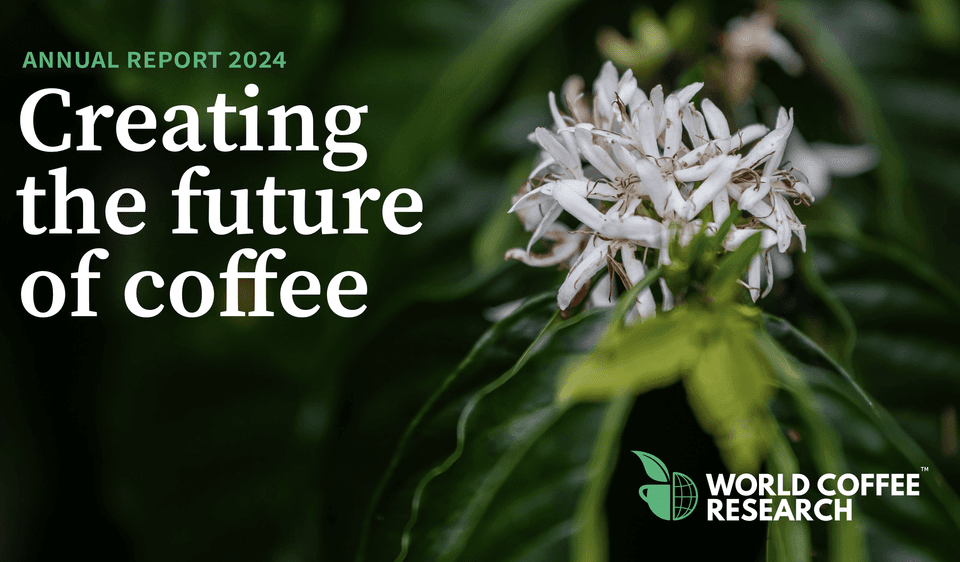World Coffee Research releases 2023 annual report
Newly released 2024 annual report provides highlights from the past year, updates on major program areas
In 2024, World Coffee Research (WCR)—with investment from 200+ member companies from 29 countries and in collaboration with its global partners—made tremendous progress toward the development and distribution of tomorrow’s climate-resilient coffee varieties. WCR’s team, spread across 16 countries, continued to drive scientific innovation for the coffee sector to increase the access and availability of high-quality planting materials, ensuring that farmers today and in decades to come will have the choices they need to sustain their livelihoods.
“Despite our industry facing historic high coffee prices that have revealed the vulnerability of supply in the face of increasing consolidation and climate shocks, I am more confident than ever that the future of coffee is bright,” said WCR CEO Dr. Vern Long. “WCR’s model of global, collaborative, industry-driven coffee variety development will deliver economic benefits to farmers, stabilize export revenues for coffee countries, and ensure access to high-quality beans for roasters, retailers, and coffee drinkers around the world.”
The 2024 annual report includes updates on WCR’s four major program areas—breeding, trials, nursery, and global leadership—and highlights from the progress achieved over the past year.
2024 global highlights
This year, WCR:
- Successfully and legally transferred genetic materials from the Innovea Arabica Breeding Network—the most diverse group of high-performing arabica breeding materials ever created—across international borders, which are now growing in 7 countries globally, including Costa Rica, El Salvador, Kenya, Mexico, Rwanda, Uganda, and the United States.
- Launched a first-of-its-kind speed breeding program for coffee for WCR’s own Innovea arabica varieties, which is expediting breeding timelines to be able to release the best trees from this population for commercial testing starting in 2030.
- Confirmed official partnerships with Vietnam, Uganda, and Ghana, which together produce 48% of the world’s robusta, ahead of the formal 2025 launch of its growing robusta breeding network.
- Generated 44 robusta cross combinations—creating a total of 1,000 unique genotypes using material provided by CIRAD—that will be grown and evaluated via the robusta network.
- Shipped 10,000 seedlings of the final four candidate WCR F1 hybrid varieties to Costa Rica, Guatemala, and Peru for larger pre-commercial trials with farmers, cooperatives, and a national coffee institute, supported by WCR member companies, which will be installed in 2025.
- Transitioned the International Multilocation Variety Trial (IMLVT) to a new, more focused phase with six mature sites closing and seven original sites being confirmed for a 6-year extension of the trial to enable the collection of yield, disease, and quality performance data after rejuvenation pruning.
- Established 20 total arabica seed lots across Peru and Uganda—that together will be capable of producing over 4 million seedlings annually—to expedite the movement of improved varieties into farmers’ hands in these countries and ensure quality control to support the availability of healthy, genetically conforming seed in key growing regions.
- Supported Honduras and Guatemala to eliminate genetic contamination points from commercial seed lots by performing extensive sample collection and DNA testing to inform the removal of non-conforming plants and ensure high-quality seed for the future.
- Catalyzed increased public support for coffee agricultural research & development (R&D) across the United States via the U.S. Department of Agriculture (USDA) and G7 countries to prioritize research imperative for genetic improvement and sustainability, with a focus on varieties.
- Launched and hosted key knowledge products and resources about coffee agricultural R&D that were viewed by 222,000 people hailing from every country in the world.
- Secured multi-year commitments totaling $10 million from its 200+ member companies in 29 countries, which will support the organization’s continued objectives of developing climate-resilient, high-performing coffee varieties and delivering them to farmers’ fields.
WCR is deeply appreciative of the opportunities it has had this year to accomplish all the work outlined above, and the organization’s team looks forward to the transformative change that 2025 will bring. “Coffee has the potential to thrive in the face of climate change because of the sustained commitment of WCR member companies and our partner governments accelerating innovation in agriculture,” says Dr. Long, “Together, we are creating a resilient future for coffee.”
To reflect on this past year’s progress and celebrate what’s to come for the future of coffee, access the annual report below.
The 2024 annual report is available in English, Spanish, and German. Japanese and Korean translations will be available in the coming weeks.
